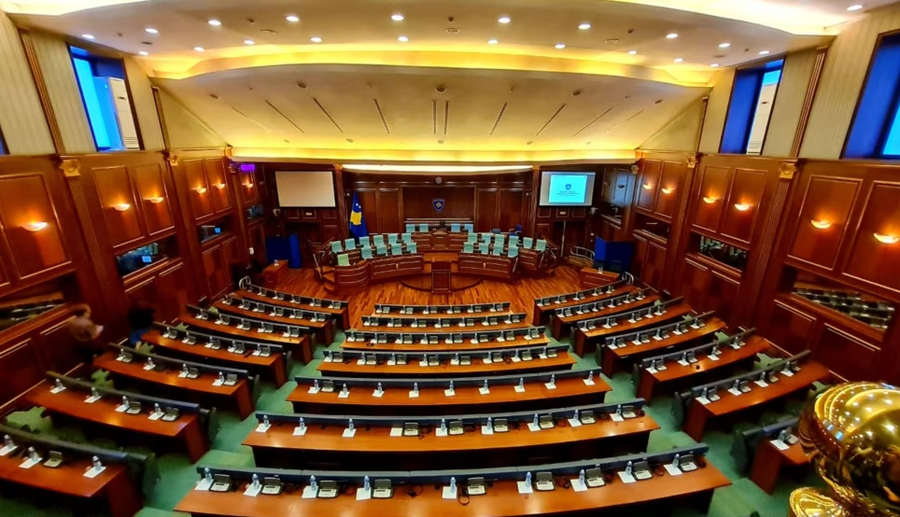
The Central Election Commission (CEC) certified the results of the February 9 parliamentary elections on Thursday, thus paving the way for the formation of Kosovo's new institutions.
At a meeting on Thursday afternoon in Pristina, the CEC approved the certification of the final election results with 9 votes in favor and 2 against.
The results were certified one day after all deadlines for parties and candidates for deputies to file complaints with the Complaints and Appeals Panel and the Supreme Court passed.
The Vetëvendosje Movement (LVV) won the February 9 elections, receiving 42.30 percent of the vote, leaving behind the Democratic Party of Kosovo with 20.95 percent and the Democratic League of Kosovo with 18.27 percent.
In fourth place is the coalition between the Alliance for the Future of Kosovo and the Social Democratic Initiative with 7.06 percent.
The Serbian List – the largest Serb party in Kosovo – secured 4.26 percent of the vote.
Three mayors - including the PDK candidate for prime minister in these elections, Bedri Hamza - gave up their mandate as MPs because, according to the laws and the Constitution, they do not have the right to hold two official positions.
The Mayor of Peja, Gazmend Muhaxheri, resigned from his mandate as an MP and will be replaced by Arben Gashi. The Mayor of Lipjan, Imri Ahmeti, will be replaced by Paris Guri, while the Mayor of South Mitrovica, Bedri Hamza, will be replaced by Rashit Qalaj.
The procedures for the formation of new institutions are provided for in the Constitution and other laws, as the following text explains.
The constitution of the new Assembly of Kosovo
Immediately after the certification of the election results, the first step is the constitution of the new parliamentary composition and then the formation of the new Government.
According to the Constitution and the Rules of Procedure of the Assembly, after the certification of the election results, the President of Kosovo, Vjosa Osmani, must convene the constitutive session of the Assembly within 30 days.
During this session, the new deputies take the oath and then elect the chairmen and deputy chairmen.
The position of Speaker of the Assembly belongs to the first party in the election, in this case LVV. Meanwhile, the largest political parties propose a candidate for deputy speaker, but also the deputies of the Serb community and those of the non-majority communities must propose one deputy for the position of deputy speaker.
The President and Vice-Presidents are elected by majority vote. The constitutive session, according to the Rules of Procedure of the Assembly, ends with their election.
"Interruptions during the constitutive session cannot be longer than 48 hours," states Article 12, point 5 of the Rules of Procedure of the Assembly.
Limiting the powers of the current executive
With the constitution of the Assembly, the way is opened for the formation of the new executive. However, in this interim period – from the constitution of the new parliamentary composition to the formation of the new executive – the powers of the current Government are limited.
These restrictions are provided for in Article 31 of the Law on Government.
This article states that the Government does not have the right to approve initiatives or sign international agreements that require ratification by the Assembly, cannot approve laws, strategies, and concept documents, cannot propose candidates for certain positions, nor appoint people to public positions.
The new government
During this period, President Osmani, according to the laws, is obliged to nominate the winning party as the mandate holder for the formation of the new Government.
The proposed government cabinet must secure the votes of 61 MPs.
The LVV has secured 48 seats in the Kosovo Assembly, the PDK, 24, the LDK, 20 seats, the Serbian List, nine seats, and the AAK-Nisma coalition, eight seats.
So, it seems that no single party will be able to form the Government alone, but coalitions will have to be formed for the new executive.
Regarding coalitions, LVV has said that it prefers to form a Government with non-majority parties – which have ten guaranteed seats in the Kosovo Assembly.
The major Albanian parties have also expressed their opposition to cooperating with the LVV for the new executive. However, Kurti has expressed his conviction that he will lead the new government.
However, if LVV fails to secure the support of 61 MPs, then President Osmani is obliged to invite political parties to consultations within ten days.
After consultations, it is at its discretion to decide on the new prime minister, if he proves that he has the numbers to form the executive.
The mandate holder then has 15 days to present the composition of the government cabinet to the Assembly.
But, if the Government is not formed even after the second attempt, then President Osmani, according to Article 95 of the Constitution, must announce new elections, which must be held no later than 40 days.
The February 9 elections were the first regular parliamentary elections held in Kosovo since the declaration of independence./ REL (A2 Televizion)










